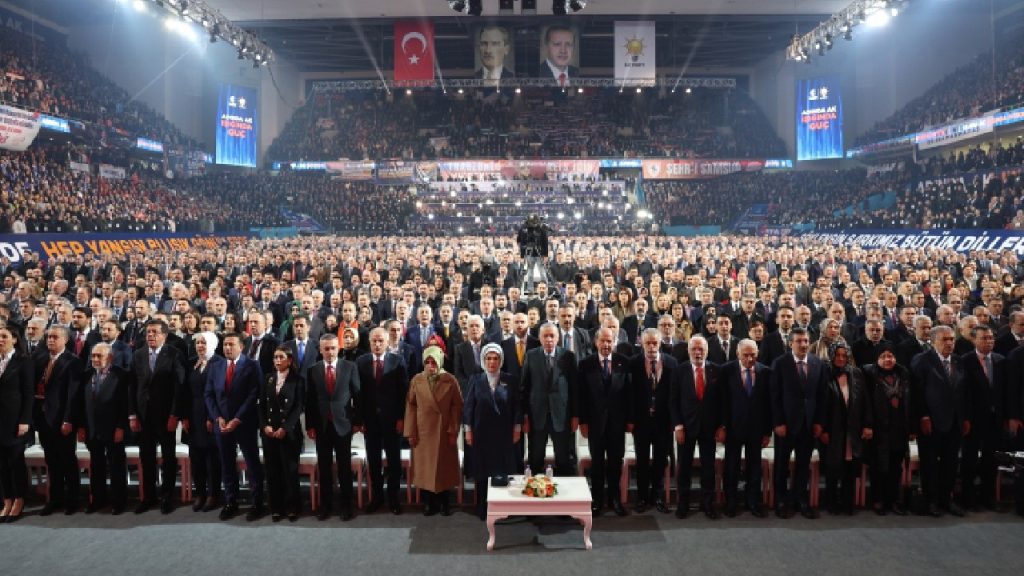Turkey’s ruling Justice and Development Party (AKP) recently convened its eighth regular congress in Ankara, where a significant restructuring of its Central Decision and Executive Board (MKYK) took place. With a 52 percent turnover, the new 75-member board introduced 39 fresh faces, including former lawmakers from opposition parties. This strategic shift aims to prepare the party for the upcoming 2028 elections while also reflecting a commitment to blending experience with new perspectives.
| Article Subheadings |
|---|
| 1) Restructuring of the AKP Leadership |
| 2) Notable Political Shifts and New Members |
| 3) The Role of Family Connections in Leadership |
| 4) Focus on Industry and Business Relations |
| 5) Erdoğan’s Address: A Call for Unity and Progress |
Restructuring of the AKP Leadership
The AKP’s eighth regular congress marked a pivotal moment in the party’s history, with the election of a revamped Central Decision and Executive Board (MKYK) that reflects a substantial change in its leadership structure. This congress, held on February 23, in the capital city of Ankara, resulted in 39 new appointments out of a total of 75 board members. This overhaul, resulting in a 52 percent change, positions the AKP strategically ahead of the anticipated 2028 elections. The restructuring aimed not only to refresh the party’s image but also to align its leadership with contemporary political dynamics and the challenges facing Turkey.
Notable Political Shifts and New Members
In a notable shift within Turkey’s political landscape, several lawmakers have transitioned from opposition parties to join the AKP. This includes seven members who moved from the İYİ Party and the Future Party. The lawmakers who crossed over include prominent figures such as Nebi Hatipoğlu, Serap Yazıcı Özbudun, and Kürşat Zorlu. Their transitions signal a strategic maneuver by the AKP to consolidate power and erase the boundaries between ruling and opposition parties. The inclusion of these individuals is indicative of the AKP’s attempts to draw in a broader coalition of support as they look toward future elections. The congressional gathering served not only as a formal event but as a platform to reinforce the AKP’s dominance in Turkish politics.
The Role of Family Connections in Leadership
Family dynamics play a significant role in the AKP’s leadership, evidenced by the inclusion of children of established party figures in the new board. This trend raises questions about meritocracy within the party’s structure, as seen with members like Mücahit Arınç, the son of former Deputy Prime Minister Bülent Arınç, and Osman Gökçek, whose father Melih Gökçek previously served as Mayor of Ankara. The presence of these familial connections may be perceived as a way to ensure loyalty and continuity in leadership, while critics might argue it underscores a lack of diversity in political representation. Furthermore, figures from outside traditional politics, such as former footballer Mesut Özil, illustrate the AKP’s strategy to appeal to various demographics, particularly the youth.
Focus on Industry and Business Relations
In his address following the congress, President Recep Tayyip Erdoğan underscored the government’s commitment to fostering positive relationships with industrial and business leaders. This emphasis on collaboration came in light of recent legal investigations involving members of the Turkish Industry and Business Association (TÜSİAD), which have been critical of the government. Erdoğan’s remarks contained a dual message: support for productive industry engagement while also warning against criticism that may be perceived as challenging the state’s authority. This highlights the balancing act the AKP must perform, ensuring economic growth while maintaining political stability in a climate of dissent.
Erdoğan’s Address: A Call for Unity and Progress
During the AKP congress, Erdoğan delivered a powerful speech that attributed the party’s historical success to its roots in “sincerity and integrity.” He rejected notions that the AKP’s rise was due to unethical practices or political maneuvering, asserting that the party has consistently addressed its shortcomings head-on. Erdoğan also directed comments towards opposition parties, suggesting their expectations of the AKP’s failure were misplaced and emphasizing the party’s resilience. His rhetoric serves to solidify the AKP’s narrative of strength and durability in contrast to perceived weaknesses in the opposition.
| No. | Key Points |
|---|---|
| 1 | The AKP’s restructuring resulted in a 52% turnover in its MKYK leadership. |
| 2 | Seven opposition lawmakers switched to the AKP, highlighting political shifts. |
| 3 | Multiple new members have familial connections to prominent political figures. |
| 4 | Erdoğan warned critics in the business sector while emphasizing collaboration. |
| 5 | The President’s address illustrated a message of resilience against the opposition. |
Summary
The recent AKP congress and the consequential restructuring of its leadership mark a critical step as the party gears up for the 2028 elections. With an infusion of new members, including realignments from opposition parties, the AKP aims to consolidate its power while addressing internal and external challenges. Erdoğan’s focus on sincerity and unity signals a commitment to evolve while remaining steadfast against critiques, ensuring that the party remains a dominant force in Turkish politics.
Frequently Asked Questions
Question: What is the significance of the recent AKP congress?
The AKP congress is significant as it represented a major restructuring of the party leadership, indicating a strategic shift aimed at consolidating power and preparing for the upcoming 2028 elections.
Question: How many new members were appointed to the MKYK?
A total of 39 new members were appointed to the MKYK, resulting in a 52 percent turnover in the party’s highest decision-making body.
Question: What does Erdoğan’s speech at the congress emphasize?
Erdoğan’s speech emphasized the party’s integrity, resilience against opposition expectations of failure, and the importance of collaboration with business leaders while warning against criticism of the government.


